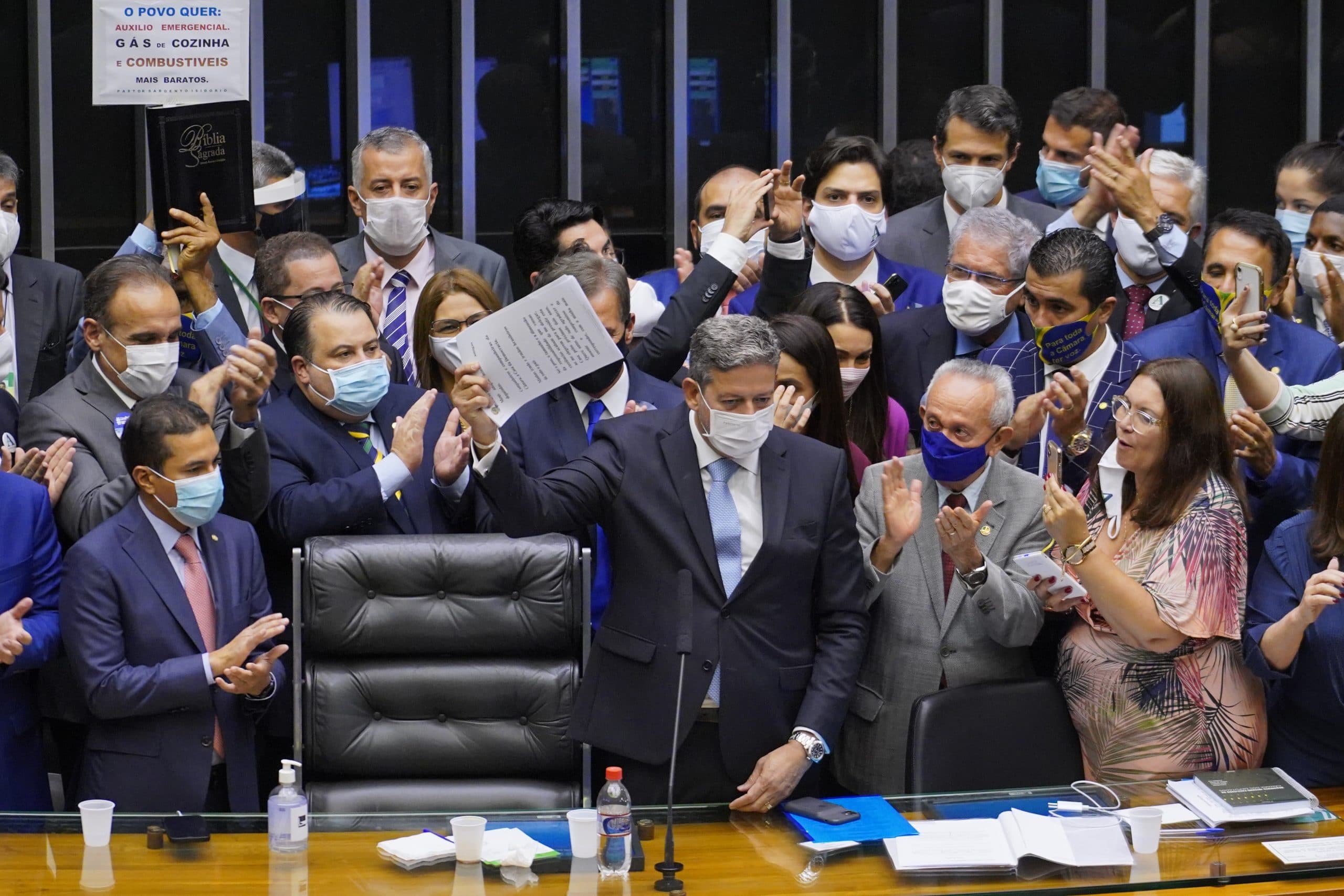The election of Arthur Lira (Progressives, PP) and Rodrigo Pacheco (Democrats, DEM) to the presidencies of the Chamber of Deputies and the Senate respectively, signify an undeniable political victory for the Bolsonaro government. This victory will, at least for a time, grant the government thicker armor and the ability to advance its agenda through Congress.
Led by former Chamber of Deputies president Rodrigo Maia (DEM), the traditional parties of the right were bitterly defeated by the Bolsonaro government. This defeat came about after a significant portion of deputies from the traditional right, parties such as the Democrats, the Brazilian Social Democracy Party (PSDB), and the Brazilian Democratic Movement (MDB), saw a significant portion of their deputies stampede to its Bolsonarista competitor. This overwhelming setback exposes and accentuates the difficulties that the liberal right has in posing as an alternative to a Bolsonarismo which is now in alliance with the “Centrão” (parties of the political center).
For its part, much of both the left (Workers’ Party (PT) and the Communist Party of Brazil (PCdoB)) and the center-left (Democratic Labor Party (PDT), the Brazilian Socialist Party (PSB), and the Sustainability Network (REDE)), have also harvested a clear political defeat from the wreckage of the unsuccessful candidate of Baleia Rossi (MDB) for the Chamber of Deputies presidency. The Party of Socialism and Freedom (PSOL) did not subscribe to the unsuccessful PT / PCdoB bloc with the liberal right in the lower house, and instead launched its own candidate, Luiza Erundina, in a campaign that played an important political role.
The obscene and grotesque scenes of the congressional elections – vote-buying in broad daylight, group betrayal, and ceremonies without masks in the midst of the pandemic – reveal a National Congress dominated by the sordidness of decadent right-wing political parties.
Faced with the triumph of the Bolsonaro and Centrão government, lessons need to be learned for the political struggle both inside and outside Congress. Below we put forward three conclusions about this process that we believe are useful for the Brazilian left.
(1) The liberal right cannot be counted on in the fight against neo-fascism
The main enemy of Brazilian working people is called Jair Bolsonaro. The government of this genocidal, far-right winger needs to be terminated as soon as possible, in order to save lives, democratic freedoms, and social and labor rights. Therefore, nothing is more important than defeating Bolsonaro. The question is: who can we count on in this struggle?
On the one hand, part of the ruling class, and in particular its ruling nucleus, is dissatisfied with and in political opposition to Bolsonaro, to a certain extent. On the other hand, the whole of the bourgeoisie agrees with the government’s economic policy and believes that the election of Arthur Lira allows for better conditions for advancing the anti-popular reforms of the Minister for the Economy and arch-neoliberal Paulo Guedes.
Accordingly, the Brazilian bourgeoisie does not want Bolsonaro impeached, at least for now. This is despite the fact that its main sector intends to support another electoral alternative in 2022, such as the São Paulo state governor João Dória (PSDB) or high-profile TV host and entrepreneur Luciano Huck. Moreover, a good part of the political representatives of the dominant classes – the parties and leaderships of the traditional right and the Centrão – operate on the logic of ‘toma-lá-dá-cá’ (give-and-take). In exchange for posts, money, and ministries, they leave aside their considerations of protocol and regard for democracy and move, without so much as blushing, to become part of the support base for the far-right wing government which destroys democratic freedoms.
This is so much so that the drying up of the Baleia Rossi candidacy occurred as a result of group desertions from the Democrats, PSDB, MDB, and other right-wing parties, who joined Arthur Lira in exchange for the plentiful gifts offered by the federal government. Rodrigo Maia was so humiliated by the loss of the majority of the Democrats (DEM), his own party, that he did not even have the courage to open the impeachment process. This is because Maia knows that the ruling class, even that layer which is the most discontented with Bolsonaro, would not support him in this endeavor.
In the end, a bizarre picture emerged in which the candidacy led by the liberal right was abandoned by the majority of the liberal right. Those who remained and ended up as Baleia Rossi’s principal support were the left and center-left parties, who had even more MPs than their allies for the occasion, and yet accepted the leadership of the liberal-bourgeoisie.
In 2016, the liberal right allied with the far-right, on the streets and in Congress, during the parliamentary coup against former PT president Dilma Rousseff. In 2018, they enthusiastically supported Bolsonaro in the second round against PT president candidate Fernando Haddad, and who doesn’t remember ‘BolsoDória’ (the Bolsonaro / São Paulo governor João Dória alliance)? Now in 2021, the liberal right has betrayed an alliance with the PT and the PCdoB to receive money, positions, and ministries in the Bolsonaro government.
The lesson remains: we cannot count on the liberal right in the fight against Bolsonaro. Yes, it is possible and desirable to make one-off, specific unity with these sectors, when they are ready to take concrete action against the far-right government. But in this case, the Rodrigo Maia bloc did not even commit itself to the impeachment of the genocidal president. Maia ended his term of office by shelving over 60 impeachment requests. The support for Baleia’s candidacy by the PT and PCdoB has therefore proved to be a serious political error, which moreover has had a disastrous practical result.
(2) Parliamentary tactics must be subordinate to the fight outside of Congress
The parliament, controlled by bourgeois representatives of every stripe – reactionaries, merchants of faith, conservatives, mafiosa, fascists, liberals, the corrupt, racists, misogynists, billionaires, militia leaders, military representatives, big rural landowners, lobbyists, and others – is rather adverse terrain for the actions of left-wing parties and leaders who are committed to the cause of the workers, the poor and the oppressed.
In this den of thieves, the main function of a socialist parliamentarian is to use the institutional tribune to echo the struggle of the working people and the oppressed, and thus strengthen social mobilization. All history teaches that the main achievements obtained in the bourgeois parliament derive from the great social struggles that have taken place outside of it. For example, various advances enshrined in the 1988 Constitution, such as the creation of the Unified Health System (SUS), were not the work of the goodwill of the constituting deputies, but of the mass struggle of the working class that shook the country in the 1980s. This imposed a correlation of forces in society that forced the majority of parliamentarians to accept these social advances in the Constitution.
The same applies to the overthrow of governments. It takes a great deal of attrition and deterioration of support for a government among the population and gigantic street demonstrations to pressure Congress to form a majority for the ousting of a president.
In this sense, the correct tactic in the election for the presidency of the Chamber of Deputies would have been to launch a unified left candidacy (PT, PSOL, and PCdoB), and call for support for this formulation from the center-left (PDT, PSB, and Rede). Above all, such a candidacy would have served to strengthen the social struggle outside of Congress and speak to the people by using this institutional position.
With this in mind, it proved to be correct for the majority of the PSOL to launch the candidacy of Luiza Erundina when the majority of the PT and the PCdoB opted to become part of the Rodrigo Maia bloc. The PSOL candidate put forward a program in defense of the interests of the country’s working and oppressed majority, defended ‘Fora Bolsonaro’ (Bolsonaro Out), vaccinations for all now, emergency aid until the pandemic ends, and opposition to all reforms and measures that remove social and labor rights. In this way, Erundina was the only left-wing voice in the election to the president of the Chamber. She did not garner many votes, it is true, but she spoke to the people outside the Centrão- dominated Congress.
(3) Tactics must center on the construction of the United Front of the left, the social movements, trade unions, and sectors of the oppressed for mass struggle
The balance of forces in Congress –now more favorable to Bolsonaro, who has incorporated the Centrão into the government, but sees him more hostage to this insidious political bloc – does not reflect the balance of forces in society. According to opinion polls, the deterioration of support for the government has increased considerably in all social strata, but more intensely in the poorest sectors of the population. The combination of the explosion of the second wave of the pandemic, the catastrophe in Manaus, the delay in vaccination, the end of emergency aid, rising unemployment, and food price inflation is leading to rapid rise in the rejection of Bolsonaro. In the sphere of popular action, there have been significant ‘panelaços’ (the Brazilian equivalent of ‘cacerolazos’ – protests of people banging pots and pans) and large ‘carreatas’ (motorcade protests) throughout the country in recent weeks, which demonstrate a willingness of a sector of society to mobilize.
It is in this context of greater popular discontent that the left must act in a united manner, to amplify the deterioration of support for the government and broaden the social mobilizations. And it is only possible to mobilize the working and oppressed class if the left raises the banners that are most felt by the people, such as the defense of emergency aid, jobs, public services and public servants, social and labor rights, and opposition to privatization and Administrative Reform. The liberal right does not support these demands, as it is in favor of the neoliberal agenda of Paulo Guedes. For this reason, only the political forces committed to workers can raise a program of concrete measures capable of mobilizing sectors of the masses.
The construction of this United Front took a big step forward in the Plenária Nacional de Organização das Lutas Populares (National Plenary for the Organization of Popular Struggles), which took place on January 26. This event set out a timetable of struggles and actions around what are central banners for the working class. For instance, another day of ‘carreatas’ has been set for February 21.
In Congress, the left-wing parties should act as a bloc for the promotion of social struggle and the placing of obstacles in the way of the advance of Bolsonarista and right-wing agendas in parliament. Through such an articulation of consistent and combative action both within and outside of the institutional framework, the left would gain strength within the working and popular layers.
This article is an English translation of “Três lições de uma derrota”, Esquerda Online (EOL), 03/02/2021.
Translation: Bobby Sparks




Comentários